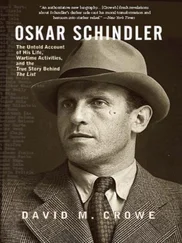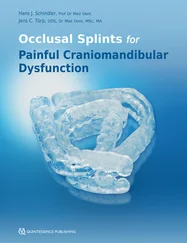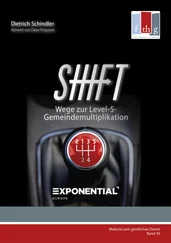So, ironically, the first Brinnlitz men to discover that the women might be let out of Auschwitz were Rosner and Horowitz, themselves on their way there.
Rosner and Horowitz were ecstatic. They told their sons: This good gentleman is bringing your mother back to Brinnlitz. Rosner asked the Unterscharführer if he would give a letter to Manci, and Horowitz pleaded to be able to write to Regina. The two letters were written on pieces of paper the Unterscharführer gave them, the same stuff the man used to write to his own wife. In his letter, Rosner made arrangements with Manci to meet at an address in Podgórze if they both survived.
When Rosner and Horowitz had finished writing, the SS man put the letters in his jacket. Where have you been these past years?
Rosner wondered. Did you start out as a fanatic? Did you cheer when the gods on the rostrum screamed, “The Jews are our misfortune”?
Later in the journey, Olek turned his head in against Henry’s arm and began to weep. He would not at first tell Rosner what was wrong. When he did speak at last, it was to say that he was sorry to drag Henry off to Auschwitz. “To die just because of me,” he said. Henry could have tried to soothe him by telling lies, but it wouldn’t have worked. All the children knew about the gas. They grew petulant when you tried to deceive them.
The Unterscharführer leaned over.
Surely he had not heard, but there were tears in his eyes. Olek seemed astonished by them—the way another child might be astounded by a cycling circus animal. He stared at the man. What was startling was that they looked like fraternal tears, the tears of a fellow prisoner. “I know what will happen,” said the Unterscharführer. “We’ve lost the war. You’ll get the tattoo. You’ll survive.”
Henry got the impression that the man was making promises not to the child but to himself, arming himself with an assurance which—in five years’ time perhaps, when he remembered this train journey—he could use to soothe himself.
On the afternoon of her attempt to find the wires, Clara Sternberg heard the calling of names and the sound of women’s laughter from the direction of the Schindlerfrauen barracks. She crawled from her own damp hut and saw the Schindler women lined up beyond an inner fence of the women’s camp. Some of them were dressed only in blouses and long drawers. Skeleton women, without a chance. But they were chattering like girls. Even the blond SS girl seemed delighted, for she too would be liberated from Auschwitz if they were.
“Schindlergruppe,” she called, “you’re going to the sauna and then to the trains.” She seemed to have a sense of the uniqueness of the event. Doomed women from the barracks all around looked blankly out through the wire at the celebratory girls. They compelled you to watch, those list women, because they were so suddenly out of balance with the rest of the city. It meant nothing, of course. It was an eccentric event; it had no bearing on the majority’s life; it did not reverse the process or lighten the smoky air. But for Clara Sternberg, the sight was intolerable. As it was also for sixty-year-old Mrs. Krumholz, also half-dead in a hut assigned to the older women. Mrs. Krumholz began to argue with the Dutch Kapo at the door of her barracks. I’m going out to join them, she said. The Dutch Kapo put up a mist of arguments. In the end, she said, you’re better off here. If you go, you’ll die in the cattle cars. Besides that, I’ll have to explain why you aren’t here. You can tell them, said Mrs. Krumholz, that it’s because I’m on the Schindler list. It’s all fixed.
The books will balance. There’s no question about it. They argued for five minutes and in the process talked of their families, finding out about each other’s origins, perhaps looking for a vulnerable point outside the strict logic of the dispute. It turned out that the Dutch woman’s name was also Krumholz. The two of them began discussing the whereabouts of their families. My husband is in Sachsenhausen, I think, said the Dutch Mrs. Krumholz. The Cracow Mrs. Krumholz said, My husband and grown son have gone somewhere.
I think Mauthausen. I’m meant to be in the Schindler camp in Moravia. Those women beyond the fence, that’s where they’re going. They’re not going anywhere, said the Dutch Mrs. Krumholz. Believe me. No one goes anywhere, except in one direction. The Cracow Mrs. Krumholz said, They think they’re going somewhere. Please! For even if the Schindlerfrauen were deluded, Mrs. Krumholz from Cracow wanted to share the delusion. The Dutch Kapo understood this and at last opened the door of the barracks, for whatever it was worth.
For a fence now stood between Mrs. Krumholz, Mrs. Sternberg, and the rest of the Schindler women. It was not an electrified perimeter fence. It was nonetheless built, according to the rulings of Section D, of at least eighteen strands of wire. The strands ran closest together at the top. Farther down, they were stretched in parallel strands about six inches apart. But between each set of parallels and the next there was a gap of less than a foot. That day, according to the testimony of witnesses and of the women themselves, both Mrs. Krumholz and Mrs. Sternberg somehow tore their way through the fence to rejoin the Schindler women in whatever daydream of rescue they were enjoying. Dragging themselves through the perhaps nine-inch gap, stretching the wire, ripping their clothes off and tearing their flesh on the barbs, they put themselves back on the Schindler list. No one stopped them because no one believed it possible. To the other women of Auschwitz, it was in any case an irrelevant example. For any other escapee, the breaching of that fence brought you only to another, and then another, and so to the outer voltage of the place. Whereas for Sternberg and Krumholz, this fence was the only one. The clothing they’d brought with them from the ghetto and kept in repair in muddy Płaszów hung now on the wire. Naked and streaked with blood, they ran in among the Schindler women.
Mrs. Rachela Korn, condemned to a hospital hut at the age of forty-four, had also been dragged out the window of the place by her daughter, who now held her upright in the Schindler column. For her as for the other two, it was a birthday. Everyone in the line seemed to be congratulating them.
In the washhouse, the Schindler women were barbered. Latvian girls sheared a lice promenade down the length of their skulls and shaved their armpits and pubes. After their shower they were marched naked to the quartermaster’s hut, where the clothes of the dead were issued to them. When they saw themselves shaven and in odds and ends of clothing, they broke into laughter—the hilarity of the very young. The sight of little Mila Pfefferberg, down to 70 pounds, occupying garments cut for a fat lady had them reeling with hilarity. Half-dead and dressed in their paint-coded rags, they pranced, modeled, mimed, and giggled like schoolgirls.
“What’s Schindler going to do with all the old women?” Clara Sternberg heard an SS girl ask a colleague.
“It’s no one’s business,” the colleague said. “Let him open an old people’s home if he wants.”
No matter what your expectations, it was always a horrifying thing to go into the trains. Even in cold weather, there was a sense of smothering, compounded by blackness. On entering a car, the children always pushed themselves toward any sliver of light. That morning, Niusia Horowitz did that, positioning herself against the far wall at a place where a slat had come loose. When she looked out through the gap, she could see across the railway lines to the wires of the men’s camp. She noticed a straggle of children over there, staring at the train and waving. There seemed to be a very personal insistence to their movements. She thought it strange that one of them resembled her six-year-old brother, who was safe with Schindler. And the boy at his side was a double for their cousin Olek Rosner. Then, of course, she understood. It was Richard. It was Olek.
Читать дальше












